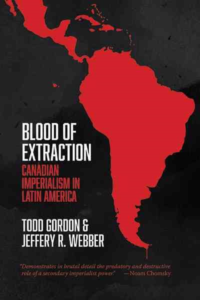From 2009 to May of 2014, at least 23 people were murdered in relation to conflicts with Canadian-based mining companies in Latin America. This is only one of many astounding facts revealed in Todd Gordon and Jeffery R. Webber’s new book, Blood of Extraction: Canadian Imperialism in Latin America, published on Nov. 1, 2016. Gordon, Assistant Professor of Law and Society and Social Justice and Community Engagement at Wilfrid Laurier University authored Imperialist Canada, published in 2010, and Webber published Red October: Left-Indigenous Struggles in Modern Bolivia in 2011. Their new book exposes Canadian state and corporate imperialism in Latin America on a massive scale.
At a book launch on Jan. 11 in Ottawa, Gordon stressed that although Canada may not be an international superpower, its imperial interests are nonetheless formidable and undeniable. In fact, Gordon explained that although Canada places behind the United States as the second largest foreign investor in the Latin American economy, proportionally to the size of Canada’s economy, we are investing much more heavily than our American counterparts. Alongside these foreign investments in mining comes the often violent suppression of human rights and extensive pollution of land and water supplies in the name of astronomical private profits.
Gordon and Webber explained in an email with the Leveller that they sought to “develop a more systematic analysis of Canada as imperialist, showing the structural roots of Canadian imperialism, [and] its connect[ion] to the system of global capitalism” through the publication of this book. They also noted that “[m]any of the big Canadian companies violating Indigenous rights abroad got their start in Canada on Indigenous land. That provided the platform for them to grow in the first place and become internationally competitive companies.” The link between settler colonialism at home and imperialism abroad is a key feature of the authors’ analysis throughout the book.
In the book, the authors delve into Canadian mining projects in six Central and South American states: Bolivia, Peru, Mexico, El Salvador, Guatemala and Panama. Gordon and Webber place a significant focus on “the voices of people resisting Canadian practices in Latin America,” revealed through dozens of interviews conducted across the continent. Those who oppose Canadian mining imperialism, therefore, are “not treated as passive victims but as active agents of resistance,” as the authors explained.
To write the book, the authors relied upon Access to Information documents provided by the Canadian government. Gordon explained at the book launch that these documents revealed an unanticipated level of collaboration between many government departments in order to facilitate and support Canadian corporate interests in Latin America, including Indigenous and Northern Affairs Canada, the Ministry of Natural Resources and even Health Canada.
When asked what Canadians can do in order to combat state and corporate imperialism in Latin America, Gordon and Webber responded by stating: “knowing that people are resisting Canadian practices abroad is very important; and where possible forging links with them, finding ways of supporting their struggles. One thing at home is to support efforts to create legislation that provides meaningful accountability measures on Canadian companies that violate human and environmental rights abroad. That won’t be done without a movement of people that can create sustained pressure on the government.”
Copies of Blood of Extraction can be purchased at Octopus Books, 116 Third Avenue or online at fernwoodpublishing.ca.
This article first appeared in the Leveller Vol. 9, No. 4 (January/February 2017).








